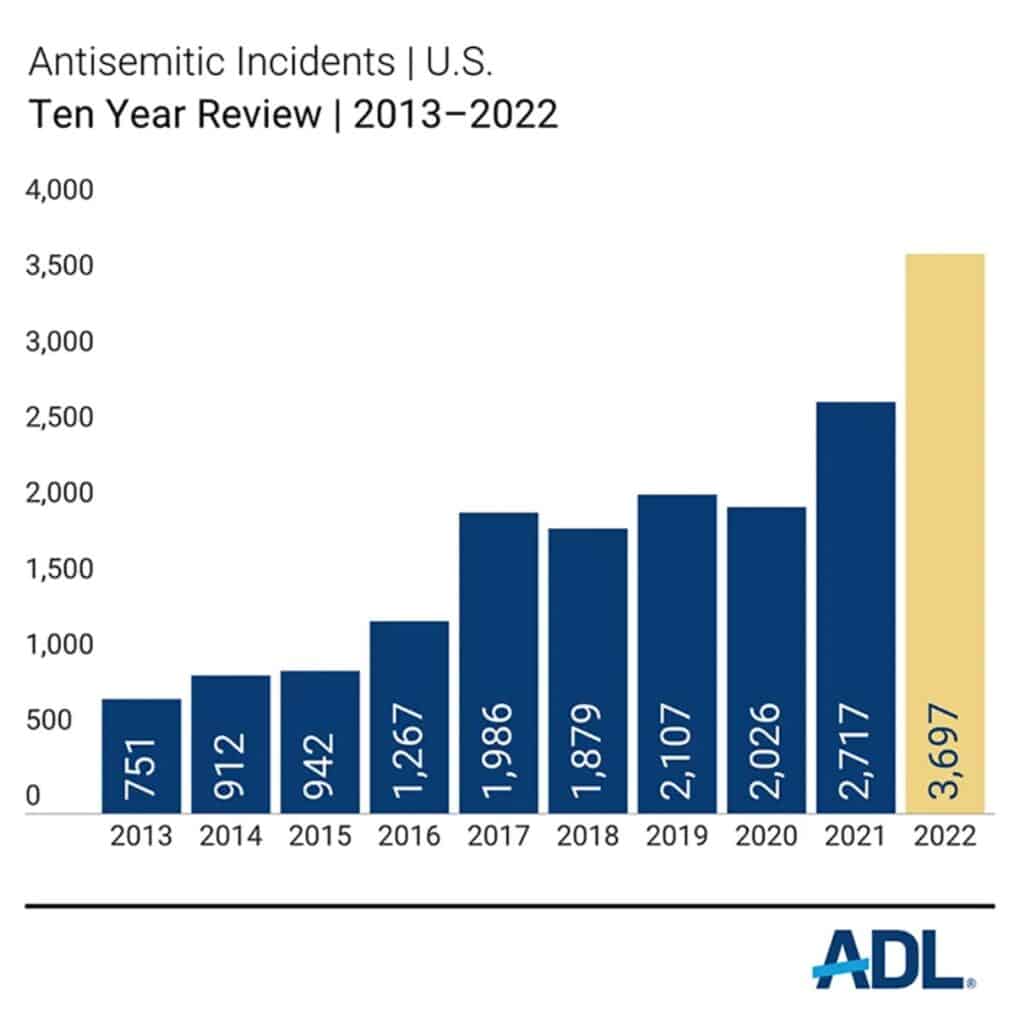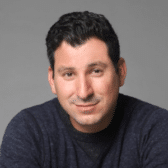Is anti-Zionism always antisemitism?
That question hit close to home this week. This past Friday night, my sister-in-law was walking on my block in South Florida with her 1 ½-year-old daughter. At my house, a bunch of us were davening, and she chose to go for a walk.
As she is walking, a car pulls up to her, slows down, whistles…and a guy dangling a necklace with a Palestinian flag, looks at her and says: “You ben zona (literally “son of a whore”), you’re the mother of an animal.”
My sister-in-law was scared and shaken, and she fled to our neighbor’s. She didn’t feel safe coming back for dinner.
For a long time, I’ve wondered if the noise out there about antisemitism in the U.S. is really as bad as people say.
The latest antisemitism report, published on Monday by the ADL and Tel Aviv University, found that there were nearly 3,700 antisemitic incidents in the U.S. in 2022, the highest number ever recorded since the ADL began collecting this data in 1979. The previous year also set a record with about 2,700 incidents.

The rise in antisemitism wasn’t limited to the U.S. but also occurred in other countries, like Belgium, Hungary, Italy and Australia.
Dozens of antisemitic assaults were reported in New York, London, and several other cities, including beatings and other forms of assaults. And that doesn’t even include the surge in hatred directed at Jews and Israel online.
You hear about instances of antisemitism, and people talk about it, but my sister-in-law experiencing it firsthand made it real.
As she recounted, the man in the car appeared to be expressing genuine hostility. He meant what he was saying. He hated her and every Jew simply for being Jewish.
As Israel is about to turn 75, it reminded me of why the Jewish state has always mattered and why it still matters in 2023.
First, Israel is the only place where a total Jewish experience is possible. I’m not referring to religious behavior. I mean that when the Jewish people lead their own state, the calendar, the language and the festivities follow the Jewish rhythm. The great poet, Hayim Nahman Bialik, said it best: “Everything that is created in the Land of Israel by Jews becomes culture.”
Second, Israel continues to provide a safe haven for Jews. One major purpose in creating the Jewish state was to ensure the Jewish people would control their own destiny. For thousands of years, we were wandering, exiled, persecuted, oppressed, embarrassed.
The 19th-century Zionist thinker Leon Pinsker — who by the way does not get nearly enough credit in Zionist history — envisioned Israel as a safe haven for Jews:
“In order to build a secure home [and] end our endless life of wandering…we must first determine…what country is…suitable to offer the Jews of all lands who must leave their homes a secure and undisputed refuge, capable of flourishing.”
Fast forward several decades to November 29, 1947, the night when the U.N. voted to partition the land into two states, one Jewish and one Arab. The world had officially carved out a sliver of real estate that the Jews could call their own.
The Israeli author Amos Oz, who was 8 years old at the time, living in Jerusalem, recalled listening to the results of the UN vote over the crackling radio.
Both of Oz’s parents were refugees from Europe, with relatives who had not made it out in time. The family knew exactly what this vote meant for the Jewish people. Oz’s father, Arieh, famously said to his son:
“From now on, from the moment we have our own state, you will never be bullied just because you are a Jew. Not that. Never again. From tonight that’s finished. Forever.” Oz later said this was the only time he ever saw his father cry.
That was back in 1947. Today, over 75 years later, I am proud that there is a Jewish state. I am proud of all of Israel’s accomplishments — the revival of the Hebrew language, the creation of the kibbutz, Israel’s development into a tech powerhouse, and defending itself against existential threats.
I am proud of the rich Jewish history in this land, the spirituality that emanates from there, and the never-ending dance between being a democratic and Jewish state.
I am American, and at the same time, I am enamored by Israel, which has already accomplished so much.
Third, Israel matters because it is the Jewish home, the place where our story began thousands of years ago.
The narrative used to be: “They tried to kill us, we won, let’s eat!” But Zionism is not just about surviving. The goal of Israel goes beyond being a safe haven for all Jews. Saul Singer wanted to update the narrative to be: “They tried to kill us, we won, now we’re changing the world.”
But the truth is that Israel’s accomplishments in its first 75 years are the cherry on top. At the end of the day, Israel matters to me because I am part of the Jewish people and Israel is the Jewish home. It is the place where Jewish memory began forming.
In its Declaration of Independence, Israel’s founders wrote: “The Land of Israel was the birthplace of the Jewish people. Here, their spiritual, religious, and national identity was formed. Here, they achieved independence and created a culture of national and universal significance. Here, they wrote and gave the Bible to the world…”
And, the Jewish state restored dignity to a people that had been beaten down after the Holocaust and 2,000 years of exile.
The existence of a Jewish homeland gives me a sense of strength. What I’m celebrating this Yom Haatzmaut is the strength that I have to not be afraid of that person who did this to my sister-in-law, to follow in the footsteps of Sir Isaiah Berlin, who said that Zionism and a Jewish state “restored to Jews not merely their personal dignity… but what is vastly more important… the basic freedom of choice,” to choose as individuals how they will live.
So, is it antisemitic to do what this person did to my sister-in-law? I think it was, but we’ll let the legislators figure that out. What I know is that verbally assaulting someone because they look a certain way is hurtful, scary and unacceptable.
I will continue to wear my kippah in public. Our dignity is not for sale.
